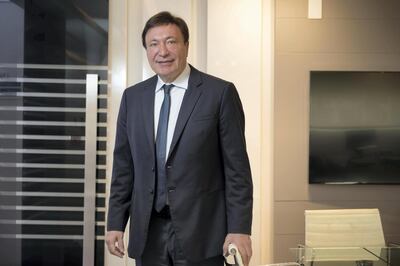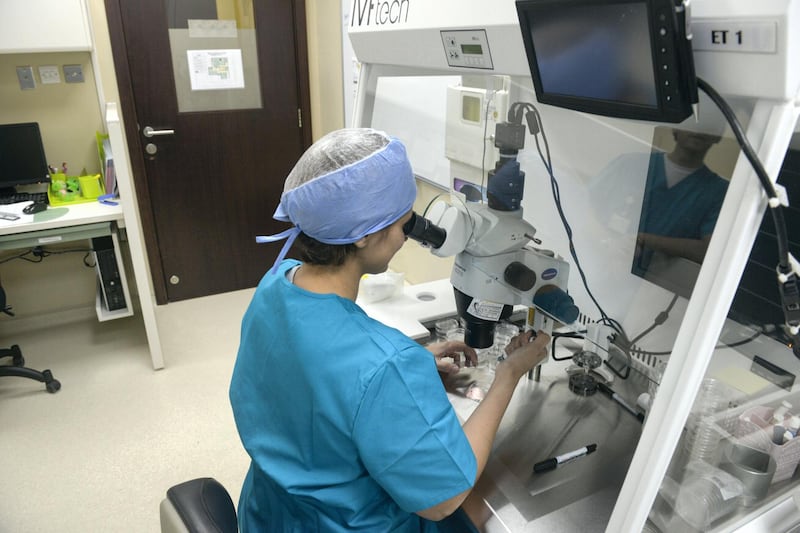Gone are the days when couples were encouraged to wait and not rush into marriage and children: today, IVF specialists recommend that those who want to start a family should consider doing it sooner rather than later.
With IVF centres across the UAE working on overdrive to complete hundreds of IVF cycles per month for Emiratis, one thing is clear – couples are having more trouble conceiving without medical intervention.
While some argue that, internationally, infertility rates have not risen, you only have to walk into any UAE IVF centre to see dozens of patients waiting in line to know it is a significant problem, nonetheless. There are no statistics available in this country, but specialists say they have noticed more and more couples and particularly men requiring treatment.
Dr Walid Sayed, medical director of HealthPlus Fertility Centre and an IVF consultant, said: “IVF centres are seeing a lot of patients right now and I personally believe that it is because of a mix of increased awareness, an increase in male infertility and delayed marriage.”
Around 40 per cent of the time, it is the man that has a fertility problem, the centre’s IVF lab director, Dr Irfan Aslam said. Internationally, it is also male infertility, specifically, that has risen. The cause is simply an unhealthy lifestyle that may include smoking, the use of anabolic steroids, obesity and diabetes.
This number rises to 60 per cent when the couple wants to conceive a second child. This is known as secondary infertility.
“Secondary infertility is a problem. It is increasing and the centre has seen many cases where the quality of the sperm is so poor that it makes you wonder how pregnancy happened before. The cause is always lifestyle. Testicular dysfunction is mostly irreversible and there is no medication that can improve the quality of sperm,” Dr Sayed said.
IVF specialist at the centre, Dr Ghada Hosny, said it is unfortunate that men are not properly informed that smoking and an unhealthy lifestyle can cause infertility and is also the cause of repeated miscarriages.
Dr Sayed estimates that around 30 to 35 per cent of couples in the UAE suffer from fertility problems. “Unfortunately, there are no statistics and this is an estimated guess, but we presume the numbers are quite high.”
In 2017 they administered over 2,750 cycles compared to 2010 where 600 cycles were performed. The high demand for their services has led to the opening of another IVF branch in Dubai.
Dr Michael Fakih, chairman, founder and medical director of Fakih IVF, said another reason for infertility is that couples are getting married later in life.

“In the past, women would get married as young as 14. Now it is 34 or 35, and it’s usual to see a large number of unmarried women.”
As women reach their mid-thirties, their fertility rates begin to rapidly decline and the majority of IVF patients are over 35.
“Once you hit 35, it starts going down every year and by the age of 40 there is a drastic drop. At 44, the chance of conceiving is less than 5 per cent.”
Lifestyle is a strong factor as well, Dr Fakih says. “It is typical in Dubai to see people eating out late at night and then going to sleep immediately afterwards.”
On male infertility, Dr Fakih said that sperm counts were previously at 20 million per millilitre. It has now dropped to 15 million.
Another factor, he said, is the lack of sexual relations between couples “because everyone is busy, their sexual life is non-existent so they don’t even have enough sex to get pregnant”.
Fatma*, 36, said that she underwent IVF because of her husband’s job. She said: “My husband works at the military and travels for months. I don’t see him enough to have a baby and I am getting older. On the days that I am fertile, he is always away on duty so my gynaecologist suggested IVF. Many of my friends have done the same. My parents didn’t understand at first, but they want grandchildren.”
“In the text books, 40 per cent of the time a couple cannot conceive because of the man and 40 per cent of the time because of the women. The remaining 20 per cent is both. But in the UAE, for patients needing IVF, it is mostly because of the male factor – they have problems with a low sperm count or no sperm at all,” Dr Fakih said.
_______________
Read more:
[ Unmarried Emirati women are for the first time freezing their eggs ]
[ 'Mediterranean' diet could increase chances of IVF birth, says study ]
UAE medics see infertility rise driven by lifestyle diseases and late marriages
_______________
“It is not easy to treat if there is a problem with the sperm. The implantation rate is less, miscarriage rates are higher and the embryo quality isn’t as good.”
Today many centres first improve sperm quality before starting IVF.
“In the past, it was thought that if you could fertilise the egg then the rest is autopilot, but data showed that this isn’t true and there is risk of greater genetic problems [if the sperm quality is low]. Today, it is also a requirement to do genetic testing on the embryos if there is a sperm problem,” Dr Fakih said.
The leading IVF specialist advice is for couples to get married earlier.
“I’m not saying by the age of 15 or even 20, but by their mid-twenties. I’ve said this several times – [couples] would get engaged and spend two or three years engaged and then they would separate so [they] really lost the prime of [their] lives.”
Dr Mohamed Elkalyoubi, consultant of obstetrics and gynaecology and reproductive medicine at Dubai government’s first gynaecology and fertility centre, said fertility rates vary from country to country and that, in the case of male fertility, “there are many environmental factors involved such as toxins, contaminated water and food”.
“Globally, there is an increase in prostate cancer, low testosterone levels and less sexual intercourse. I personally have started to see more male infertility than when I came here ten years ago and that is for two reasons: awareness and lifestyle: smoking, obesity, diabetes and use of anabolic drugs.”
The cost of an IVF cycle will depend on the couple’s medical condition, so for some it might cost Dh30,000 while for others it might cost up to Dh50,000. The first IVF cycle is not always successful and a couple might have to go back for several IVF cycles before it results in a succesful pregnancy.
* This person requested that their name was changed





